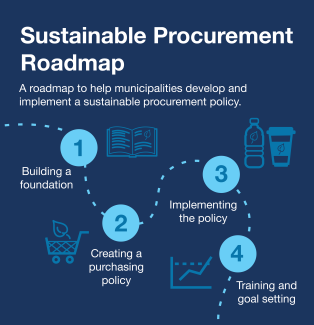How the Ecology Center's work on sustainable, accountable government procurement policies reduces toxic chemicals from entering the environment, supports communities, and addresses climate change.
When the government goes shopping, the shopping bags are big. And when governments purchase clean products that have been responsibly sourced and do not contain harmful chemicals, they can play a major role in reducing GHG emissions and toxic waste, thus protecting our health, our communities, and the environment.
You might do this already: Choose local apples over those that have traveled thousands of miles. Buy things with reusable or recyclable packaging. Or even invest your retirement account in environmentally or socially responsible funds. Collectively, responsible spending makes a big difference. For example, a recent study from Harvard University found that after safer furniture was purchased, levels of toxic chemicals in interior dust decreased, reducing occupants' exposure.
We understand the impact purchasing can have on social change, which is why the Ecology Center and our partners have targeted some of the biggest purchasers of all – governments – as an intervention point. In Fiscal Year 2022, agencies of the United States federal government spent $259 billion buying products. State and local governments spend a great deal on procurement, too–about $1.3 trillion each year. On the shopping list are pens, staplers, computers, cleaning supplies, pesticides, construction materials, furnishings, vehicles, medical devices, playground equipment, carpet and flooring, and more.
In the last few years, our hard work on sustainable procurement has been paying off.
Our first win was in the Ecology Center’s hometown of Ann Arbor. In 2019, we worked with the City to create a sustainable procurement policy explicitly listing PFAS and other hazardous chemicals to avoid in city purchasing. This policy has been a model for other small- and mid-sized cities looking to create non-toxic purchasing policies.
Though our focus has been helping Great Lakes communities transition to sustainable purchasing, we share our lessons learned with any interested municipality. That’s how we helped Anchorage, AK, and Providence, RI, pass resolutions to move their sustainable procurement policies forward in 2020. We continue working with cities across the region, including the cities of Dayton and Toledo, OH, and Toronto, Canada to help implement sustainable purchasing practices.
We formalized our work with cities regionally through the Great Lakes Climate Adaptation Network (GLCAN) procurement group, an information-sharing peer network for sustainable purchasing. Through the network, municipal employees, university faculty and staff, and environmental health experts share knowledge and support each other as they work to implement sustainable purchasing in their communities.
For example, in 2022, we helped the City of Lansing create a model equitable, non-toxic, and climate-friendly procurement policy. The policy bans purchasing products containing PFAS, phthalates, and single-use plastics, and outlines climate-friendly and equitable purchasing guidelines. In addition, the policy encourages seeking out minority-owned, locally-owned, small businesses, and unionized vendors, as well as those using fair labor practices.
"The Ecology Center and GLCAN provide much-needed information and resources that helped Lansing adopt an effective green purchasing policy," said Lori Welch, Sustainability Manager for the City of Lansing – Public Service Department. "Their continued support is helping to ensure City employees are prepared to procure goods and services that are safer and more sustainable."
At the state level, we worked with Great Lakes PFAS Action Network, a community-driven advocacy group, to successfully advocate for Michigan to sign the first PFAS-free procurement policy in the nation. This groundbreaking executive directive, signed into law in October 2021, directed state purchasers to avoid all products containing every type of PFAS. Many other states are following suit, including Maine, New York, and Colorado.
Also, in 2021, the Biden Administration released an improved framework for assessing the environmental performance standards for federal purchasing. In addition to outlining an ambitious path to achieving net-zero emissions from federal procurement, the plan also advises avoiding products containing PFAS. For example, furniture, cutlery, dishware, containers, insulation, paint, carpet and flooring, adhesives, cleaning solutions, dishwasher detergents, soaps, and many other products contain the compounds. Due to the policy, the government will no longer purchase any of this stuff if they’re laced with PFAS. Not only will that reduce individual exposure to hazardous chemicals, but it will also encourage manufacturers to stop using PFAS altogether if they want to sell to the government.
The Ecology Center helped advocate for the executive order. We also worked with national partners and PFAS-impacted community members to provide comments and resources on how the government should implement the order. Additionally, we have provided guidance, tools, and suggestions to analysts helping the Department of Defense figure out how to comply with their new PFAS-free procurement mandates.

We also helped craft a model sustainable purchasing policy and continue to provide curated resources for municipalities and organizations interested in implementing sustainable purchasing practices. These resources include general factsheets about PFAS-free purchasing, third-party certifications and eco-labels, how sustainable purchasing saves money, and less toxic purchasing.
Most recently, we developed a modular powerpoint presentation to help sustainability and purchasing staff make the case for sustainable purchasing to decision-makers (such as mayors, councils, and administrators), created a sustainable purchasing training program for municipal staff, and developed a series of fact sheets covering high volume product categories for municipal purchasers. We are currently developing guidance to embed sustainable purchasing in Zero Waste and Climate plans.
If you are interested in helping your local government adopt a sustainable purchasing policy, the Ecology Center and our partners have many resources available on the Ecology Center website. We welcome municipalities and institutions to join us as we continue to advance sustainable procurement efforts across the Great Lakes and the country.


